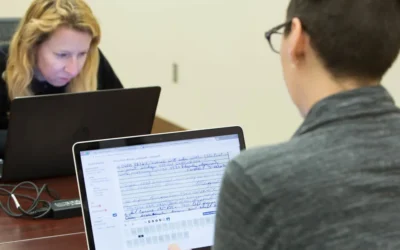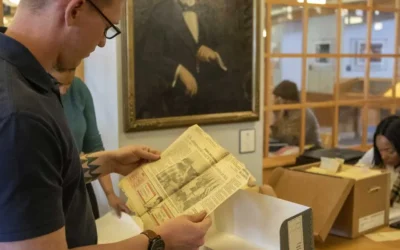Building Bridges: Archivists in Organizational Dynamics
Margot Note
In the labyrinth of organizational dynamics, archivists often find themselves navigating uncharted territories.
Their contributions, though invaluable, can slip into the shadows of underappreciation. The key to ensuring their expertise receives due acknowledgment lies in relationship-building within their organizational framework.
At the heart of this necessity is the ability of relationship-building to bridge the gap between the specialized world of archivists and the broader organizational context. Archival leaders utilize strategic networks to connect and communicate effectively. This engagement in collaborations serves as a spotlight, illuminating how archivists contribute to various facets of the organization, be it research, legal matters, marketing, or public relations.
Navigating Power Centers
The advocacy for the role of archivists within an organization demands a level of political astuteness. Identifying critical stakeholders becomes the crucial first step.
In navigating organizational dynamics, leadership within the archival domain involves a nuanced understanding of stakeholders. Leaders must recognize individuals who influence critical aspects such as financial approval, resource accessibility, and legal and regulatory boundaries. Simultaneously, comprehending superiors’ expectations is essential, with a keen focus on how archivists can contribute to their successes. In an intricate web of multiple bosses, assessing alignment and potential conflicts of interest becomes imperative.
Furthermore, it is crucial to recognize the significance of internal customers, understand their priorities, and address their challenges. Peers should be identified based on their need for archival assistance and their impact on overarching goals. Strategic investment of political capital may be necessary to garner support from influential peers. Direct reports play a pivotal role, necessitating the identification of influential team members across different contexts and predicting their stance on archival proposals. Analyzing existing alliances within the team becomes instrumental. Lastly, acknowledging the presence of informal influencers among other employees is vital, considering their potential support or opposition to archival initiatives.
Archivists should identify the power centers within the organization. Power centers are departments, teams, or individuals with significant influence and decision-making authority. These entities often play a crucial role in shaping the direction and functioning of the organization. Nurturing relationships with key individuals within these power centers is essential to advocacy.
Archivists can benefit from having independent relationships with many members of boards of directors. The potential for archivists to, at times, appear insubordinate highlights the delicate balance required in advocating for the recognition of their role. The nuanced approach showcases the value archivists bring to the organization while navigating organizational hierarchies.
Archivists as Assets
The role of archivists goes beyond preserving historical documents; it involves contributing to the organization’s objectives. By fostering relationships, archivists can position themselves as assets indispensable to the organization’s success. The collaborations that result from these relationships offer a tangible demonstration of the multifaceted support archivists provide.
Building relationships is an ongoing practice that requires dedication and perseverance. Archivists must seek opportunities to engage with colleagues from various departments, fostering a culture of mutual understanding and appreciation. As relationships grow, so does the awareness of the archivists’ expertise, leading to a natural integration of their role into the organizational fabric.
Strength in Numbers
The benefits of relationship-building extend beyond individual archivists to the entire institutional community. Collaborations and partnerships with different departments create a support network for archivists, amplifying their collective voice within the organization. This collective strength reinforces the argument for the indispensable nature of archival expertise, making it harder for organizations to overlook or undervalue the contributions of archivists.
The underappreciation of archivists within organizations can be mitigated through the deliberate practice of relationship-building. Archivists must bridge the gap between their specialized roles and the broader organizational context. By connecting with stakeholders and showcasing their contributions through collaborations, archivists can advocate for themselves and secure their rightful place within the organizational fabric. The journey toward recognition may be nuanced, but the destination is a workplace where archivists’ value is acknowledged and celebrated.
Never miss another post. Subscribe today!
Similar Posts
Collaborative Archival Relationships
Collaborative projects are instrumental in showcasing how archival collections can benefit various organizational departments.
Informational, Evidential, and Intrinsic Values within Archives
Archives provide authentic, reliable information and hold values that reflect their functions and uses; informational, evidential, and intrinsic.
A Sustainable Archives
Archivists prioritize sustainable practices and policies, rooting their work in ethics of care, often preferring digital processing and preservation
Archival Branding and PR Strategies
Archivists who adopt branding and PR strategies both safeguard historical treasures and contribute to their organizations’ evolution.




Leave a Comment
Comments are reviewed and must adhere to our comments policy.
0 Comments